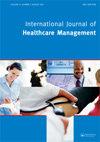{"title":"Coronaphobia among healthcare professionals and its associations with sleep quality, physical activity, and fatigue in Turkey","authors":"Özge İpek Dongaz, Dilara Özen Oruk, Asalet Aybüke Güp, Meltem Koç, B. Bayar, K. Bayar","doi":"10.1080/20479700.2023.2210392","DOIUrl":null,"url":null,"abstract":"Background: Healthcare professionals are at high risk of developing physical and mental health outcomes due to the coronavirus. Purpose: The study aimed to investigate coronaphobia levels in healthcare professionals and explore the relationship between other related factors in Turkey. Methods: This cross-sectional descriptive study included 422 participants. Sociodemographic characteristics such as age and gender;and features about working details of the participants including the history of Covid-19 were recorded. The Covid-19 Phobia Scale (C19P-S), The Fatigue Severity Scale (FSS), Jenkins Sleep Scale (JSS), and International Physical Activity Questionnaire–Short Form (IPAQ-SF) were used to measure outcomes. Results: It was found that the total mean score obtained from the C19P-S of the doctors, physiotherapists, nurse-midwives, and other health professionals in the study were 46.31 ± 14.64, 50.55 ± 15.69, 54.82 ± 19.82, and 54.38 ± 17.81, respectively. A comparison of the C19P-S results showed that there is a significant difference between health professionals (p < 0.05). Doctors' physical activity levels were statistically related to their coronaphobia levels. Similarly, the coronaphobia levels of physiotherapists, nurses, and midwives were found to have a statistically significant relationship with their fatigue levels. Conclusion: It was found that healthcare professionals in Turkey have moderate coronaphobia levels and it affected some quality of life parameters such as sleep quality, fatigue severity, and physical activity status. © 2023 Informa UK Limited, trading as Taylor & Francis Group.","PeriodicalId":46911,"journal":{"name":"International Journal of Healthcare Management","volume":" ","pages":""},"PeriodicalIF":1.1000,"publicationDate":"2023-05-10","publicationTypes":"Journal Article","fieldsOfStudy":null,"isOpenAccess":false,"openAccessPdf":"","citationCount":"0","resultStr":null,"platform":"Semanticscholar","paperid":null,"PeriodicalName":"International Journal of Healthcare Management","FirstCategoryId":"1085","ListUrlMain":"https://doi.org/10.1080/20479700.2023.2210392","RegionNum":0,"RegionCategory":null,"ArticlePicture":[],"TitleCN":null,"AbstractTextCN":null,"PMCID":null,"EPubDate":"","PubModel":"","JCR":"Q4","JCRName":"HEALTH POLICY & SERVICES","Score":null,"Total":0}
引用次数: 0
土耳其医护人员的冠状病毒恐惧症及其与睡眠质量、体力活动和疲劳的关系
背景:医疗保健专业人员因冠状病毒而出现身心健康问题的风险很高。目的:本研究旨在调查土耳其医护人员的冠状病毒恐惧症水平,并探讨其他相关因素之间的关系。方法:这项横断面描述性研究包括422名参与者。社会地理特征,如年龄和性别;并记录了参与者的工作细节,包括新冠肺炎病史。新冠肺炎恐惧症量表(C19P-S)、疲劳严重程度量表(FSS)、詹金斯睡眠量表(JSS)和国际体力活动问卷-简式(IPAQ-SF)用于测量结果。结果:研究中医生、理疗师、助产士和其他卫生专业人员的C19P-S总分分别为46.31±14.64、50.55±15.69、54.82±19.82和54.38±17.81。C19P-S结果的比较表明,卫生专业人员之间存在显著差异(p<0.05)。医生的体育活动水平与他们的冠状病毒恐惧症水平在统计学上相关。同样,物理治疗师、护士和助产士的冠状病毒恐惧症水平与他们的疲劳水平有统计学上的显著关系。结论:研究发现,土耳其的医护人员具有中等程度的冠状病毒恐惧症,它影响了一些生活质量参数,如睡眠质量、疲劳严重程度和身体活动状态。©2023 Informa UK Limited,交易名称为Taylor&Francis Group。
本文章由计算机程序翻译,如有差异,请以英文原文为准。


